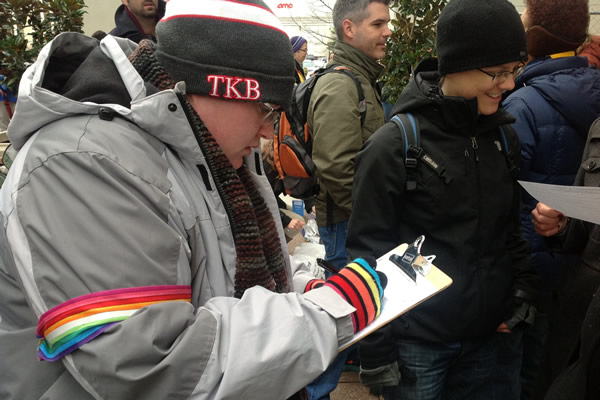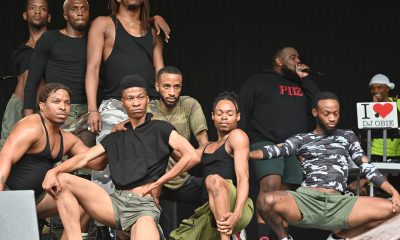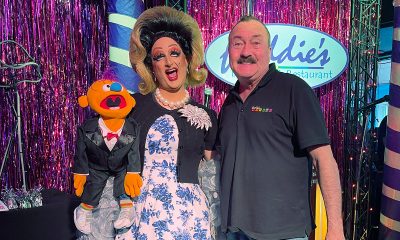Local
Same-sex couples seek Va. marriage licenses
Campaign for Southern Equality’s “We Do” campaign ended with march to D.C.
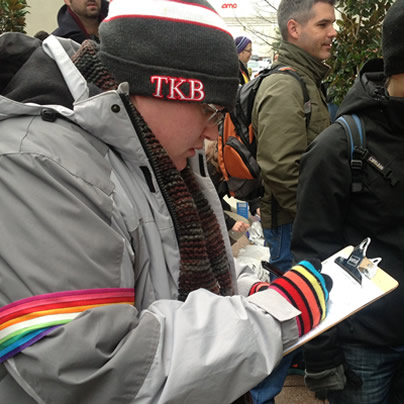
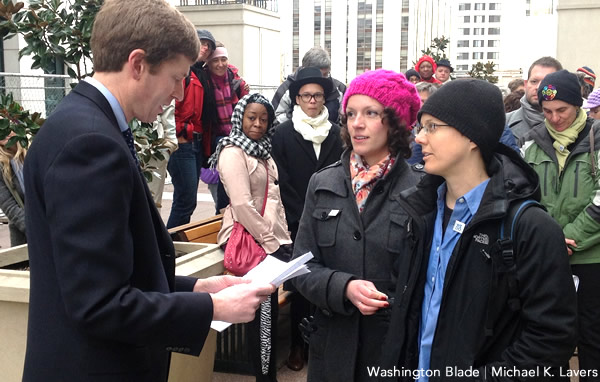
From left; D.C. residents Alyssa Weaver and Mike McVicker, who are from South Carolina, apply for a marriage license outside the Arlington County Courthouse on Jan. 17. (Washington Blade photo by Michael K. Lavers)
More than a dozen same-sex couples from across the South gathered outside the Arlington County Courthouse on Thursday to apply for marriage licenses.
Gays and lesbians from Alabama, Georgia, Mississippi, Tennessee and North and South Carolina submitted applications to Arlington Circuit Court Clerk Paul Ferguson in the complex’s plaza. A constitutional amendment that Virginia voters approved in 2006 defines marriage as between a man and a woman in the commonwealth, but those who participated in the action described their decision to take part as symbolic.
“We’re here to resist the unjust laws that label us as second class citizens and to call for full equality on the federal level,” Ivy Hill of Piedmont, S.C., told the Washington Blade after she filled out a marriage license in the complex plaza.
She and her partner of more than two years, Misha Gibson, recently became engaged.
“I’m here today to request a marriage license and knowingly being denied, but doing that to make sure that people know that we’re equal,” Gibson said. “I’m doing it to fight for my civil rights.”
Beth Schissel and Sally White of Atlanta joined four other same-sex couples who tried to apply for marriage licenses in Decatur, Ga., earlier this month.
White, who lived in Richmond for 30 years, joked with the Blade after Ferguson declined to issue them a marriage license she traveled to Virginia with her partner as a way to celebrate her birthday on Saturday.
“I’m a pediatric ER doctor,” Schissel said with tears in her eyes. “I take care of your children and take care of the sick and injured and I served my country. I went to the Air Force Academy and I served my country on active duty and yet I can’t have all the rights that are afforded me under that word marriage under federal law. So it’s a slap in the face type of feeling and it hits you deep in your core.”
The Arlington protest was the last in a series of actions organized by the Campaign for Southern Equality to highlight a lack of marriage rights for same-sex couples in the South and to urge the federal government to extend full equality to LGBT Americans.
The “We Do” campaign kicked-off in Hattiesburg, Miss., on Jan. 2 when five gay and lesbian couples applied for marriage licenses. Others followed suit in Mobile, Ala., Morristown, Tenn., Greenville, S.C., and three North Carolina cities before traveling to Virginia.
“We all live here in the South and we’re Southern folks,” Rev. Jasmine Beach-Ferrara, executive director of the Campaign for Southern Equality, who is also an ordained minister with the United Church of Christ in Asheville, N.C., told the Blade in an interview earlier this month. “This is where we live and we’re working with LGBT folks in small towns and cities across the region who are ready to stand up for equality — federal equality in new ways.”
She stressed her group’s approach to highlight the lack of marriage rights for same-sex couples below the Mason-Dixon Line reflects a broader strategy.
“We do feel like because this is the region where discriminatory laws are most deeply enshrined in state law, it creates a really powerful and unique opportunity to revisit those laws by using peaceful, direct action,” Beach-Ferrara said. “What we’re doing with the ‘We Do’ campaign is folks are taking action in their local communities to resist these state laws, to show what happens when they’re actually enforced. They’re typically invisible because they’re so rarely enforced, if at all. And so the general public is sort of insulated from the reality that we live with day in and day out as LGBT folks in the South, which is these laws exist, but when they’re actually enacted and enforced there’s an opportunity to talk about what that actually means and how that hurts real people and real families.”
Matt Griffin and Raymie Wolfe of Morristown, Tenn., who have been together for more than seven years, sought a marriage license in their hometown on Jan. 9.
Wolfe told the Blade before he and his partner tried to obtain a Virginia marriage license that they were “met with good humor” when they tried to do the same in Tennessee. He noted the clerk said it was the first time a gay couple had ever applied for a marriage license in the town — she did reaffirm the Tennessee does not recognize nuptials for gays and lesbians.
“What we wanted to do was kind of illustrate for people and ourselves what happens when we do that,” Wolfe said. “That’s kind of unprecedented. That was my hometown. It’s where I grew up and as a gay kid there, I kind never imagined that i would be going to a courthouse with a partner and applying for a marriage license.”
Same-sex couples gathered in Arlington three days after a Virginia House of Delegates subcommittee voted against a proposal that would have repealed the state’s constitutional ban on same-sex marriage.
Neighboring Maryland is among the nine states and D.C. that allow gays and lesbians to tie the knot. North Carolina voters last May approved a constitutional amendment that defined marriage as between a man and a woman by a 61-39 percent margin, while Minnesota voters on Election Day rejected a similar proposal.
The upcoming oral arguments before the U.S. Supreme Court in cases challenging the constitutionality of the Defense of Marriage Act and California’s Proposition 8 also weighed on the minds of the same-sex couples who applied for marriage licenses and those who witnessed them do so.
“I’m very sympathetic to what the people who came before me today are trying to do and I am happy that there’s other jurisdictions where they can go to have their marriage licenses processed,” Ferguson, who is a former member of the Arlington Board of Supervisors, told the Blade. “There’s a Supreme Court decision coming up and so that will add some clarity to a lot of these peoples’ marriages, which is what they were looking for.”
Tim Young and Mark Maxwell of Winston-Salem, N.C., legally married at the Jefferson Memorial after they and other same-sex couples who had sought Virginia marriage licenses marched from Arlington to the nation’s capital.
“We live our lives in a way where we are not denied anything and we are open to being prosperous and successful,” Young, who has been with Maxwell for 20 years and raised four boys with him, said. “We’ve educated ourselves. We run a business so we pay taxes in that state and we give our money to that state, but we don’t have the same rights as other people and we believe in equity and equality.”
Beach-Ferrara noted her group made a deliberate decision to end their latest campaign in D.C.
“It’s in a lot of ways a small, intimate group, but of folks who traveled on a journey that’s symbolic in a lot of ways in the sense that if you live in the South, you need to travel to Washington, D.C., before you can be recognized as an equal citizen,” she said. “The journey folks have taken sort of helps to illustrate the legal realities that LGBT folks live with, which is you are a second class citizen until you reach the Washington border.”
Maryland
Rockville teen charged with plotting school shooting after FBI finds ‘manifesto’
Alex Ye charged with threats of mass violence

BY BRETT BARROUQUERE | A Montgomery County high school student is charged with what police describe as plans to commit a school shooting.
Andrea Ye, 18, of Rockville, whose preferred name is Alex Ye, is charged with threats of mass violence. Montgomery County Police and the FBI arrested Ye Wednesday.
The rest of this article can be found on the Baltimore Banner’s website.
District of Columbia
New D.C. LGBTQ+ bar Crush set to open April 19
An ‘all-inclusive entertainment haven,’ with dance floor, roof deck

D.C.’s newest LGBTQ+ bar called Crush is scheduled to open for business at 4 p.m. on Friday, April 19, in a spacious, two-story building with a dance floor and roof deck at 2007 14th St., N.W. in one of the city’s bustling nightlife areas.
A statement released by co-owners Stephen Rutgers and Mark Rutstein earlier this year says the new bar will provide an atmosphere that blends “nostalgia with contemporary nightlife” in a building that was home to a popular music store and radio supply shop.
Rutgers said the opening comes one day after Crush received final approval of its liquor license that was transferred from the Owl Room, a bar that operated in the same building before closing Dec. 31 of last year. The official opening also comes three days after Crush hosted a pre-opening reception for family, friends, and community members on Tuesday, April 16.
Among those attending, Rutgers said, were officials with several prominent local LGBTQ organizations, including officials with the DC Center for the LGBTQ Community, which is located across the street from Crush in the city’s Reeves Center municipal building. Also attending were Japer Bowles, director of the Mayor’s Office of LGBTQ Affairs, and Salah Czapary, director of the Mayor’s Office of Nightlife and Culture.
Rutgers said Crush plans to hold a grand opening event in a few weeks after he, Rutstein and the bar’s employees become settled into their newly opened operations.
“Step into a venue where inclusivity isn’t just a promise but a vibrant reality,” a statement posted on the Crush website says. “Imagine an all-inclusive entertainment haven where diversity isn’t just celebrated, it’s embraced as the very heartbeat of our venue,” the statement says. “Welcome to a place where love knows no bounds, and the only color or preference that matters is the vibrant tapestry of humanity itself. Welcome to Crush.”
The website says Crush will be open Tuesdays and Wednesdays from 4 p.m. to 12 a.m., Thursdays from 4 p.m. to 2 a.m., Fridays from 4 p.m. to 3 a.m., Saturdays from 2 p.m. to 3 a.m., and Sundays from 2 p.m. to 12 a.m. It will be closed on Mondays.
Crush is located less than two blocks from the U Street Metro station.
District of Columbia
Reenactment of first gay rights picket at White House draws interest of tourists
LGBTQ activists carry signs from historic 1965 protest

About 30 LGBTQ activists formed a circular picket line in front of the White House Wednesday afternoon, April 17, carrying signs calling for an end to discrimination against “homosexuals” in a reenactment of the first gay rights protest at the White House that took place 59 years earlier on April 17, 1965.
Crowds of tourists looked on with interest as the activists walked back and forth in silence in front of the White House fence on Pennsylvania Avenue. Like the 1965 event, several of the men were dressed in suits and ties and the women in dresses in keeping with a 1960s era dress code policy for protests of the Mattachine Society of Washington, D.C., the city’s first gay rights group that organized the 1965 event.
Wednesday’s reenactment was organized by D.C.’s Rainbow History Project, which made it clear that the event was not intended as a protest against President Joe Biden and his administration, which the group praised as a strong supporter of LGBTQ rights.
“I think this was an amazing event,” said Vincent Slatt, the Rainbow History Project official who led efforts to put on the event. “We had twice as many that we had hoped for that came today,” he said.
“It was so great to see a reenactment and so great to see how far we’ve come,” Slatt said. “And also, the acknowledgement of what else we still need to do.”
Slatt said participants in the event who were not carrying picket signs handed out literature explaining the purpose of the event.
A flier handed out by participants noted that among the demands of the protesters at the 1965 event were to end the ban on homosexuals from working in the federal government, an end to the ban on gays serving in the military, an end to the denial of security clearances for gays, and an end of the government’s refusal to meet with the LGBTQ community.
“The other thing that I think is really, really moving is some of the gay staff inside the White House found out this was happening and came out to greet us,” Slatt said. He noted that this highlighted how much has changed since 1965, when then President Lyndon Johnson’s White House refused to respond to a letter sent to Johnson from the Mattachine Society explaining its grievances.
“So now to have gay people in the White House coming out to give us their respects and to say hello was especially meaningful to us,” Slatt said. “That was not expected today.”
Among those walking the picket line was longtime D.C. LGBTQ rights advocate Paul Kuntzler, who is the only known surviving person who was among the White House picketers at the April 1965 event. Kuntzler said he proudly carried a newly printed version of the sign at Wednesday’s reenactment event that he carried during the 1965 protest. It stated, “Fifteen Million Homosexuals Protest Federal Treatment.”
Also participating in the event was Japer Bowles, director of D.C. Mayor Muriel Bowser’s Office of LGBTQ Affairs. Bowles presented Slatt with a proclamation issued by Bowser declaring April 17, 2024, Mattachine Society Day in Washington, D.C.
“Whereas, on April 17, 1965, the Mattachine Society of Washington courageously held the nation’s inaugural picket for gay rights, a seminal moment in the ongoing struggle for LGBTQIA+ equality in the United States, marking the genesis of public demonstrations advocating for those rights and paving the way for Pride Marches and Pride celebrations worldwide,” the proclamation states.
About 30 minutes after the reenactment event began, uniformed Secret Service agents informed Slatt that due to a security issue the picketers would have to move off the sidewalk in front of the White House and resume the picketing across the street on the sidewalk in front of Lafayette Park. When asked by the Washington Blade what the security issue was about, one of the Secret Service officers said he did not have any further details other than that his superiors informed him that the White House sidewalk would have to be temporarily cleared of all people.
Participants in the event quickly resumed their picket line on the sidewalk in front of Lafayette Park for another 30 minutes or so in keeping with the 1965 picketing event, which lasted for one hour, from 4:20 p.m. to 5:20 p.m., according to Rainbow History Project’s research into the 1965 event.
Although the LGBTQ picketers continued their procession in silence, a separate protest in Lafayette Park a short distance from the LGBTQ picketers included speakers shouting through amplified speakers. The protest was against the government of Saudi Arabia and organized by a Muslim group called Al Baqee Organization.
A statement released by the Rainbow History Project says the reenactment event, among other things, was a tribute to D.C.-area lesbian rights advocate Lilli Vincenz, who participated in the 1965 White House picketing, and D.C. gay rights pioneer Frank Kameny, who founded the Mattachine Society of Washington in the early 1960s and was the lead organizer of the 1965 White House protest. Kameny died in 2011 and Vincenz died in 2023.
The picket signs carried by participants in the reenactment event, which were reproduced from the 1965 event, had these messages:
• “DISCRIMINATION Against Homosexuals is as immoral as Discrimination Against Negroes and Jews;”
• “Government Should Combat Prejudice NOT PROMOTE IT”
• “White House Refuses Replies to Our Letters, AFRAID OF US?
• “HOMOSEXUALS Died for their Country, Too”
• “First Class Citizenship for HOMOSEXUALS”
• “Sexual Preference is Irrelevant to Employment”
• “Fifteen Million U.S. Homosexuals Protest Federal Treatment”
-

 Africa4 days ago
Africa4 days agoCongolese lawmaker introduces anti-homosexuality bill
-

 District of Columbia23 hours ago
District of Columbia23 hours agoReenactment of first gay rights picket at White House draws interest of tourists
-

 World4 days ago
World4 days agoOut in the World: LGBTQ news from Europe and Asia
-

 Arizona1 day ago
Arizona1 day agoAriz. governor vetoes anti-transgender, Ten Commandments bill

